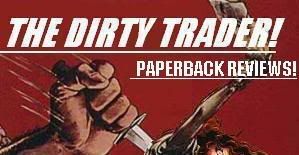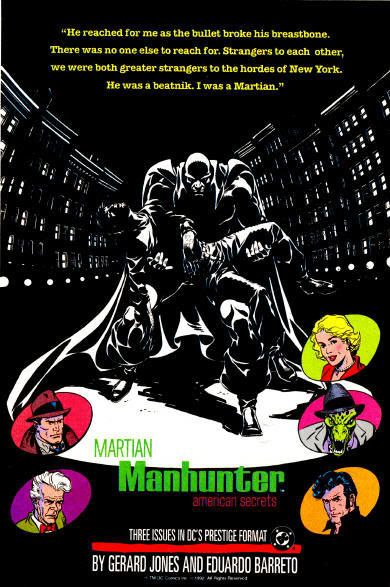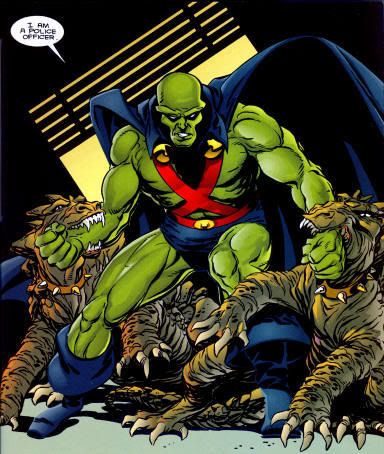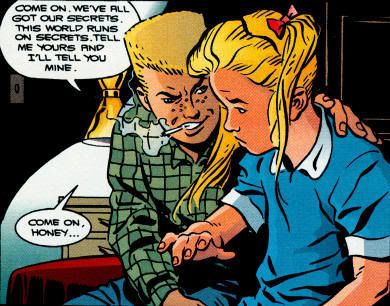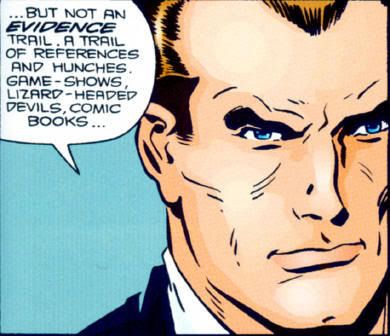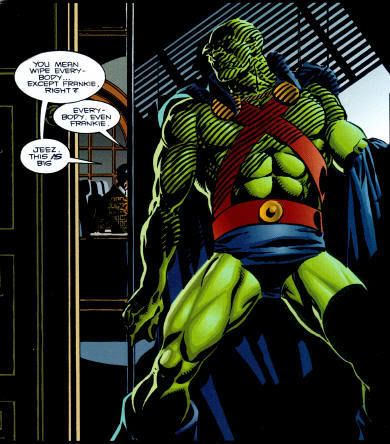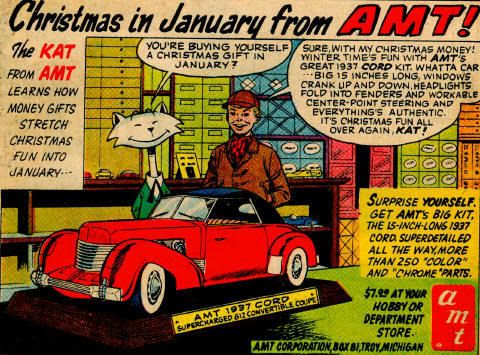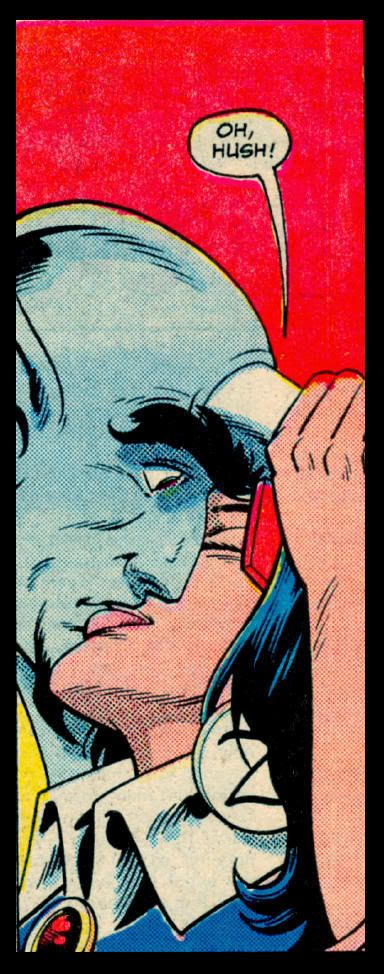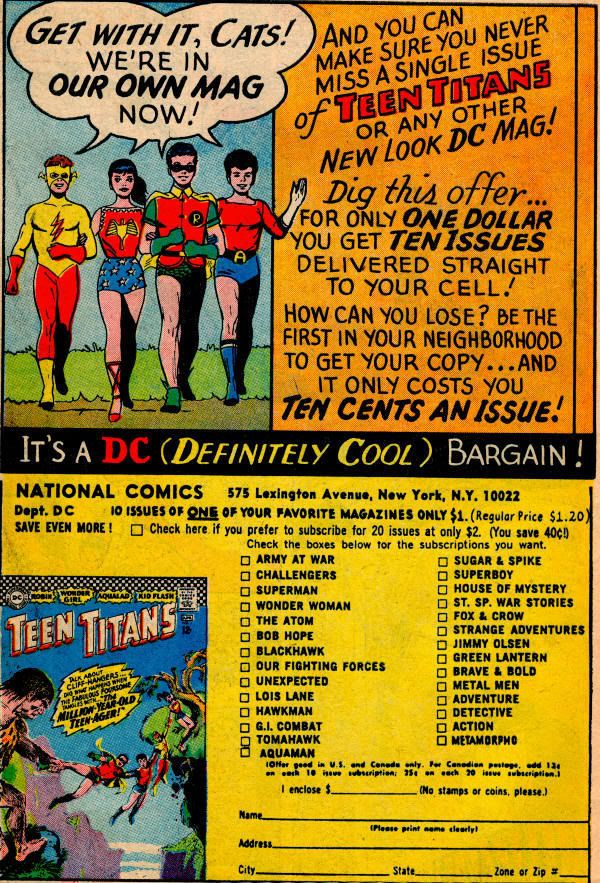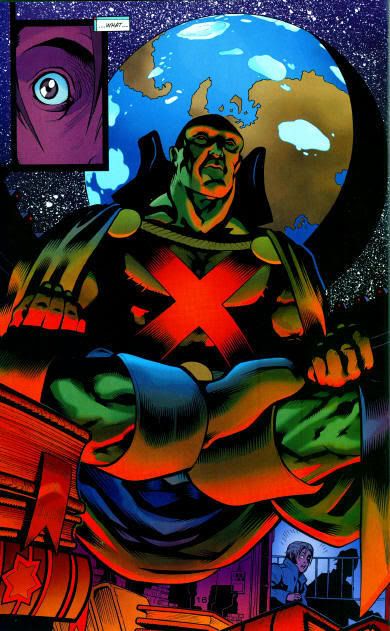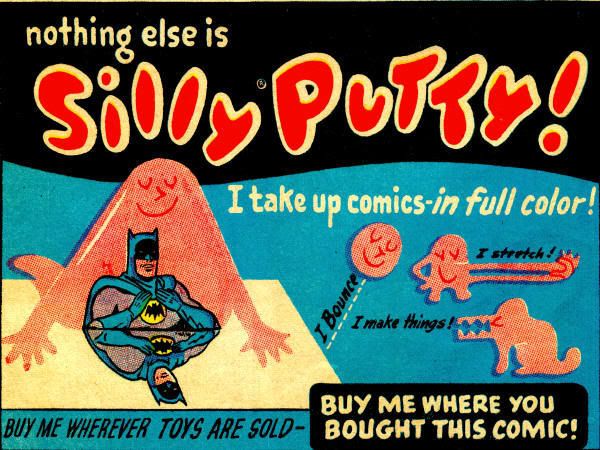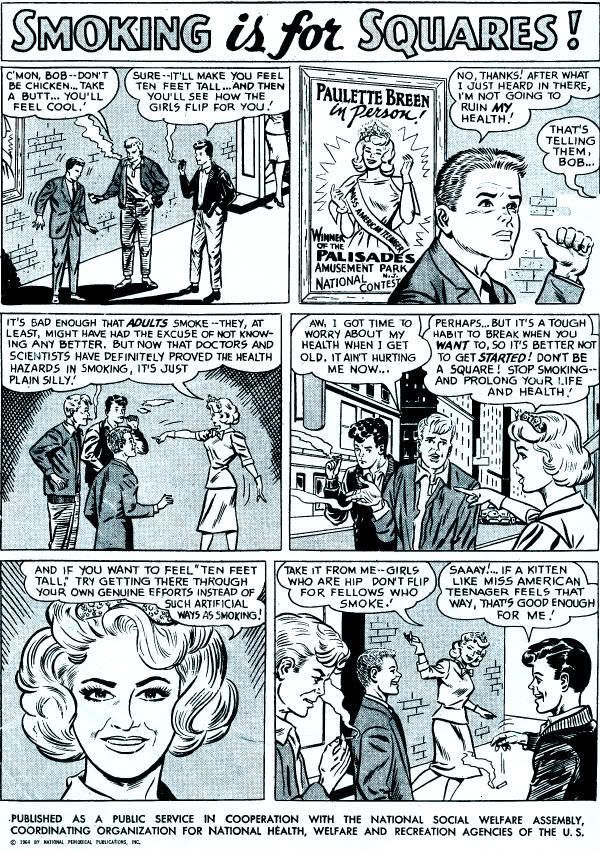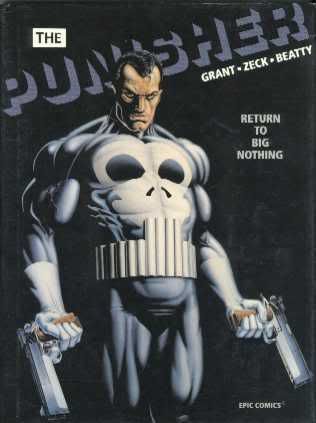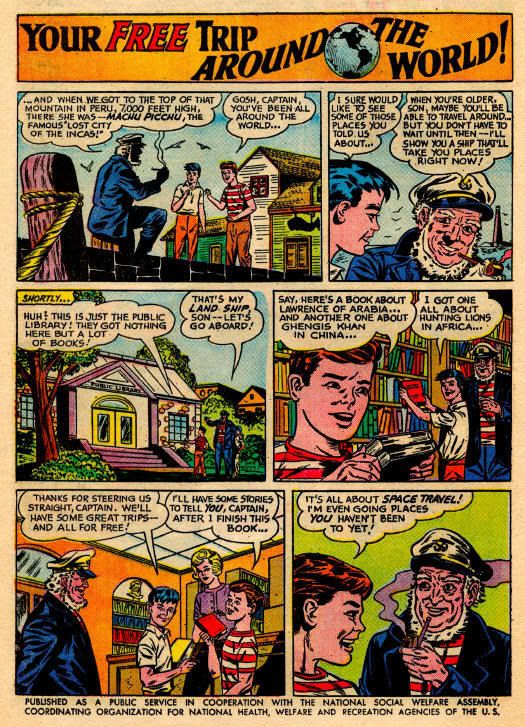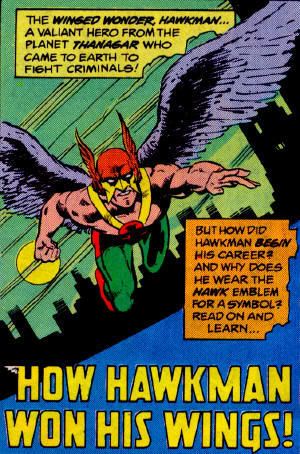
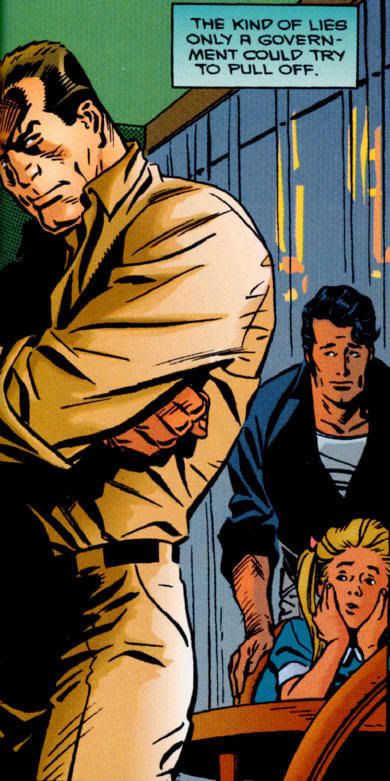
Dr. McNider proceeded to tell Detective Jones that there were no Lizard-Men, and that his group were victims "of the strangest mass hallucinations of our very strange times." McNider and Director Hoover agreed, "that we 'heroes' had somehow sprung from and embodied a spirit of national terror... and summoned up a dark side, in the bodies of our foes, that enabled us to exorcise a nation's terror through bizarre and repetitive combat... And the Director's wisdom was borne out by what happened when we chose to continue after the war. Hysteria. Suddenly Americans were seeing flying saucers. Fearing the breakdown of this magnificent society. Imagining a 'mafia.' Director Hoover is very explicit about that: There is no 'mafia.' Just as there are no 'communist conspiracies' in our government. That's the fear that our enemies want us to suffer." Detective Jones was incredulous. "I just met an agent of the F.B.I. He turned into a lizard... What enemies?" McNider responded, "The Communists."
"But you just said..." noted an increasingly irritated Jones. "That's the point! 'Red Scare' hysteria is a Communist ploy! And demagogues like Senator McCarthy were communist dupes!" Jones sat silently for a moment, staring daggers at the former Dr. Mid-Nite before scowling and leaping from his chair. "This is insane! You come here promising explanations and you talk in circles! Our fears are false, created by the people we fear so we won't fear what we should fear-- which is them? This is hog-wash! You just don't want us to trust what we see!"
"No detective! I just want you to serve the right side. Your government needs you. It needs all the Martians it can get." McNider's enhanced vision could see through J'Onzz's human form, as he claimed the JSA's "retirement" in protest of congressional red-baiting was a cover for their enlistment in the F.B.I., a role they wanted Jones to share. "That was a calculated little blow against the Red Scare. In truth, we've all been serving our country in quiet, invisible ways. The way every good American should. Beating our super-powers into tract homes, as it were. Why, heck, if the government couldn't find a use for powers like ours, they'd probably have to kill us! Ha ha... The F.B.I. is on its way, Jones. If you don't help them, they'll do what they have to do. Do you understand? Well then... ZOPRBETIE!" Jones seized McNider at that, demanding the meaning of his parting word. A little joke phrase old pal Melvin Keene used to toss around, someone that now had to be protected from trouble at times because of "that silly magazine of his."
McNider left, and Detective Jones considered his words. "Lies. But lies so big and ugly that he had to know I'd spot them. 'No mafia.' The kind of lies only a government could try to pull off... I thought I could trick them, negotiate something with them. But their negotiations could make prisoners of us-- slaves of us!" Perkins Preston believed McNider, to which Jones angrily protested, "You believed your A&R man. You believed in Leavitzville. Both nearly got you killed!"
The F.B.I., Whitey Bright in tow, came calling. Perkins Preston let them in over Jones' continued objection. "They won't hurt us, Patty Marie! They're the government." Patty Marie hugged Jones around the waist. Inspector Anole quickly led Preston into the outside hall, promising, "we'll discuss what you can do for your F.B.I." With the entertainer out of sight, the feds circled the resistant pair remaining. The returning Inspector Anole drew his flame pistol, but Jones snatched up Patty Marie and headed for the window. Whitey "Skeeter" Bright lunged for the girl's feet. "I've got plans for this little girl!" They likely did not include his losing his grip and being tossed through the window to his death. The fugitives followed after to make their escape. Inspector Anole declared, "No more subtle gestures."
Edwards Air Force Base scrambled an assault against the flying Martian. J'Onzz took evasive maneuvers, riding alongside a fighter as a means of cover. Another pilot was ordered to fire on his fellow, in order to "hit the target at any cost." The explosion that followed set Patty Marie afire while separating her from "J'Onn J'Onzz. "Help me! Catch me!" she cried. "Fire. Even this far from her, it burns me. Closer it could kill me." Closer he came, cradling the child in his arms as his powers failed him. The pair landed on the desert floor with a heavy thud, lying all too still until the sun rose. J'Onn J'Onzz reverted to his human guise. Patty Marie could no longer do anything at all.
"I have been here before. Somewhere before I've seen children killed and been left alone on a dead world. Seen children devoured on a funeral pyre and learned to fear the flames. Again I'm a speck in the desert. Blood on the snow. With the fiery eye of the world looking down on me. Is there anywhere to run? With all their eyes trained on me? Their eyes see everything. And ours? They see lizards. Is this your 'prize-to-be,' Patty? You might have been better off with the lizards. I'm sorry, Hon. Maybe this is just what comes for the ones like us. The ones who can see... Do we see what the rest don't? Or are the others just happier with their mouths shut?"
Checking the corpse of a downed pilot, John Jones found documents regarding himself and several JSAers. Further, he discovered an extra-terrestrial fungus wrapped along the pilot's nervous system. "Why? So he won't see? Or so he'll catch fire if he tries to talk?" Using the pilot's knife, Jones performed an autopsy on Patty Marie, and found her body to be fungus free. Going over the new and old information, J'Onzz realized where all the clues were pointing. Prize To Be. Beto EZ Rip. Zoprbetie. All letters found in "PTO. Iberez" in Cuba.
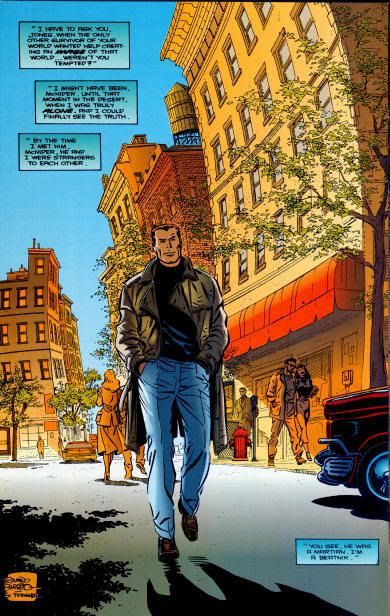
"A long drift down the Colorado River, then flight through the hills of Mexico and a stint as a Cuban sailor across the Gulf. Where I find the strength to keep going I don't know, unless it's the rum and the conga." Making his way to Havana, Jones learned about the American gangsters' stranglehold on Cuba. "I ask questions. Not too direct to bring the lizard-dogs sniffing, but direct enough to get quick answers... There are rebels in the hills, between here and Puerto Iberez... Mr. Gioconda's men are running weapons for the government troops. 'Strange weapons,' I'm told."
Jones met a poet who's book of verse was identical to the one he heard at the start of this all in New York. "The truth is written by many people in many places... Poetry be easy. But it's as near as we can get." The fungus held the poet's tongue, so he spoke cryptically at first of Latin America and "people who crossed a vast gulf, came like gods to colonize, to plant... to shape... Cuba is an island, isolated and alone. So we reach to cross our ninety miles of aloneness. Agriculture and horticulture link Cuba to the world. In her dark interior valleys the horticulture is rich." Jones noted, "You're all islands on this planet." Less one, as the poet reckoned, "And now, I'm afraid I've talked to much. It's time for me to burn for that ancient communion with the night!" His eyes bled, his face bubbled, and then he combusted. Jones fled the scene invisibly.
"I am with you in Cuba, and on the roads of America and the streets of New York. I am with you, and Melvin Keene, and all of you who see the truth but cannot speak it because of that terrible horticulture of your conquerors, that fungus in your brain. I am with every one of you who has been burned alive, and every one who risked that burning by sending coded messages of the truth. The truth of the shape-shifting conquerors who came to Earth during the terror of war, who used that terror to infiltrate governments and communications cartels, to spring the sleep of sameness over this boiling, fertile world. The truth bent into strange new shapes by profiteers and power-handlers, willing to lie down with lizards whether they could see them or not. I am with you, the defenders and the victims of the truth. I am with the murdered, and the frightened and the fooled."
J'Onn J'Onzz was with Perkins Preston, who happened to be playing at the Club Mona Lisa for Mr. Giaconda, who alerted the Master Gardener. Most notably, he was with Fidel Castro and Che Guevara, who he spurred into a raid on Puerto Iberez against the invading aliens. Perkins Preston was in turn with J'Onn J'Onzz, after learning the aliens had been using his songs to distribute subliminal messages, but he still had reservations. "These folks... they're not communists, are they, Detective Jones?"
"Communists. And what are they? Beings who live through the group-- and not themselves? Is this baseball playing warrior, this self-assigned savior a communist? There are no communists on this world. There were on mine. They're all dead now."
Perkins Preston confronted a lizard horticulturist in his garden of domination with what he had learned. "If you know this much, you must be one of the chosen. And that means I don't dare kill you. What do I do with you? What would the Master Gardener want?" The concern was taken out of the lizard's hands by the Manhunter's own, in the form of a fist. The Martian then assumed the horticulturist's likeness, and led Preston past troops with saurian-dogs. "But I am something they can't see inside. Why? Why have they failed to catch me... even now? Even here?"
The pair walked into the cavernous den of those engaged in "the cultivation of human culture." Strange organic television monitors displayed various aspects of media currently in circulation, their hidden messages made clearer as they overlapped. The concealed Martian tried to use Perkins Preston to access the Master Gardener when his vizier appeared. "The Master Gardener knows of this human, as he knows of everything. You will follow me, horticulturist... along the canal." This river teemed with the organisms that spawn the fungus. "It calls to me, strangely. Like these dark, cool chambers of sentient fungus call to me. Like an echo of my lost life."
The pair were presented to the Master Gardener in his throne room. "The human... He should show me his gratitude... that I crossed the starry gulf to bring his competitive, conflict-ridden world together... in perfect peace, serenity, equality, and order. I've given you Leavitzville! I've given you Skeeter! I've shown you how to keep your children! All I ask in return is that you give me a place to end my lonely wanderings through the stars... a place to call home."
The still incognito J'Onzz responded, "...we undermine their faith in the truth! Our quiz shows reduce truth to bits of entertaining information! We teach them to memorize rather than think!" The Master Gardener responded, "... you know how easy it is to train the masses. The artists are harder. And the heroes. They had to be manipulated. Deals had to be made, with subversives like Keene... But heroes can be tamed! ...And you can serve better than any!" The horticulturist asked, confusedly, "Me?"
Perkins had previously proven himself able to see even an invisible Martian Manhunter, and this held true when he became conscious of the fact that the Master Gardener was not what he appeared to be. Before the duo's eyes, it changed into a natural form Martian!
"Haven't you wondered why my people have been reluctant to kill you? But all my knowledge of organisms couldn't stop the spread of the microbes that slaughtered our children! My knowledge kept me alive, age after age, enclosed in my loneliness, haunted by the funeral pyres of my babies. Then the Lizard Men came. Lonely, isolated Lizard Men. I made them think I was their lost Father-God. I used my horticulture to give them new thoughts. To make them my children. But I couldn't bear the dead plains of Mars. I needed a home. I needed a world rich with life. A world I could prune and nurture into harmony. And that world is here!"
The Master Gardener and his shape-shifting Lizard Man came to Earth during World War II, and took advantage of the terror and confusion of the time to infiltrate governments and communications cartels. They grew plants bearing fungus that bonded to the human nervous system, allowing them to control the very words they spoke under threat of spontaneous combustion. Based in Puerto Iberez, Cuba, they exported the plant around the world, infecting much of the human populace with their tyranny. They were the real reason the Justice Society of America was forced to retire, and held sway over all media. "Don't they look the other way when they see the truth? Don't they settle for the happy pictures I give them of what life should be? They feel safe so long as there are warriors in the sky to protect them from the evil 'other...' They feel content so long as I feed them a simple picture of the world."
"It was my mission. This planet has become an event nexus, an intersection of cosmic forces that create great beings and attract great beings. It would continue to produce 'heroes' had I not come. In the quest for harmony, great individuals only bring chaos. Rebellion. Conflict. But such heroes can be tamed! They can serve harmony! They can help us keep our children!"
"Join me, brother! I don't know how you came across space and time to find yourself here-- but it can't be accident! Destiny brought you! Destiny placed you among Earthlings, so that you could understand their souls better than I! Help me save our new children! From themselves! Help me give birth-- to a Mars regained!"
"I know your pain, brother. But I won't pervert a world to ease it."
"You believe what they believe! Forget what Earth taught you! Remember MARS!"
"Mars is dead."
Attacking the Gardener both with ideology and fists, it wasn't long before J'Onzz attracted lizard guardsmen. Firing their flame projectors, the lizards scored a direct hit against their ruler. "But master...the fire doesn't hurt us!" The Master Gardener chuckled as he fell to an immolation-induced apparent death; "Do you hear that...brother? The fire...doesn't hurt...'us.'" J'Onzz swept the lizard guard off its feet, then ordered their troops to bomb the valley using the Gardener's communications equipment. He then succumbed to another blast of flame.
"I hear through the flames the wailing of my family. Then not that, but a deeper sound. The thunder of bombs. I am lifted and carried away. By the Fire-God, I think, to his Parlor of Red Death. But it's the canal I feel. So cool. So dark. It calls me strangely." J'Onzz was seemingly carried into the safety of the canal by Perkins Preston.
Back in the States, John Jones read a newspaper announcing Preston's death in a plane crash over Cuba. At his side was Charles McNider, who noted, "I suppose we won't be able to discuss the truth behind recent events for a long time. So long as our nervous systems are bearing our little... 'guests'..." Jones promised to finish apprehending the loose bands of directionless Lizard Men, affirming, "...eventually, this world may pour forth its 'great individuals' again." The former Dr. Mid-Nite asked if John was tempted by the Gardener's offer. "I might have been, McNider. Until that moment in the desert. When I was truly alone. And I could finally see the truth. By the time I met him, McNider, he and I were strangers to each other.
You see, he was a Martian. I'm a beatnik."
